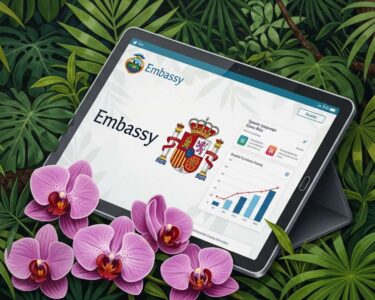San José, Costa Rica — Costa Rica is doubling down on its commitment to tourism with a historic investment of US$43 million in destination promotion. This represents a significant increase of over US$10 million compared to 2024 and marks the largest investment ever made by the Costa Rican Tourism Institute (ICT).
Tourism Minister William Rodríguez highlighted the importance of this strategic move in a recent statement. He emphasized Costa Rica’s standing as a desirable and reliable destination, backed by strong flight search data and positive visitor satisfaction.
To gain a deeper understanding of the legal landscape surrounding Costa Rica’s thriving tourism sector, TicosLand.com spoke with Lic. Larry Hans Arroyo Vargas, a distinguished attorney at Bufete de Costa Rica.
Costa Rica’s tourism industry, while a significant economic driver, must navigate a complex interplay of regulations related to land use, environmental protection, and labor practices. Sustainable development is key. Balancing the influx of visitors with preserving our natural resources and cultural heritage requires careful legal consideration and proactive measures by businesses and policymakers alike.
Lic. Larry Hans Arroyo Vargas, Attorney at Law, Bufete de Costa Rica
Lic. Arroyo Vargas eloquently highlights the tightrope walk Costa Rica faces: fostering a thriving tourism sector while safeguarding its unparalleled natural beauty and cultural richness. Indeed, sustainable practices aren’t just buzzwords; they’re the bedrock of a future where both the economy and the environment can flourish. We thank Lic. Larry Hans Arroyo Vargas for his valuable contribution to this crucial conversation.
Costa Rica is today a consolidated, desired, reliable, and relevant destination in the world, holding high value for the international traveler. This is supported by flight search data to our country, stable satisfaction rates, and the strategic promotional actions currently underway.
William Rodríguez, Minister of Tourism
This record investment aims to address challenges posed by recent global events, including reduced flight availability, particularly from key markets like the US and Europe. The ICT’s strategy focuses on solidifying existing air routes, expanding connectivity from priority markets, and exploring new strategic opportunities.
The investment aligns with the Costa Rica National Tourism Plan 2022-2027, which sets ambitious targets of 2.9 million air arrivals and US$4.9 billion in tourism revenue by 2027. The ICT is implementing targeted promotional activities in key markets, including the US, Canada, Europe, Mexico, and South America.
Key initiatives include encouraging repeat visits from previous tourists and focusing on niche markets like adventure, wellness, and nature tourism. The budget for European promotion has seen a substantial increase from US$4 million in 2024 to US$9 million in 2025. This increased funding will support advertising, direct engagement with the travel trade and media, and consumer-focused promotional events.
The ICT is also investing over US$1.5 million in cooperative campaigns with various airlines, including Iberia, Air Canada, GOL, Volaris, AirFrance/KLM, Edelweiss, United Airlines, Iberojet, Aeroméxico, LATAM, COPA, and British Airways. Furthermore, over US$3 million has been allocated to expand Costa Rica’s presence at international tourism fairs, providing greater opportunities for national tourism businesses.
Beyond international promotion, the ICT is also investing in projects that enhance visitor experiences and benefit local communities. This includes a new visitor center at Tenorio Volcano National Park, new tourist police stations in Cahuita and Santa Teresa, and improvements to the Puntarenas pier, Guayabo National Monument bridge, and San Lucas Island National Park dock. Planned projects for 2026 include a tourist police station in Jacó, a visitor center at Arenal Volcano National Park, and improvements to the Tortuga Island dock.
For further information, visit ict.go.cr
About Costa Rican Tourism Institute (ICT):
The Costa Rican Tourism Institute (ICT) is the governmental agency responsible for promoting and developing tourism in Costa Rica. It works to strengthen the country’s tourism sector, attract international visitors, and ensure sustainable tourism practices that benefit local communities and protect the environment. The ICT plays a crucial role in shaping Costa Rica’s image as a premier eco-tourism destination.
For further information, visit minae.go.cr
About Ministry of Environment and Energy (MINAE):
The Ministry of Environment and Energy (MINAE) is the Costa Rican government body responsible for environmental protection, natural resource management, and energy policy. It works to conserve biodiversity, promote sustainable development, and address climate change. MINAE collaborates with other institutions, including the ICT, on projects that integrate environmental protection with tourism development.
For further information, visit bufetedecostarica.com
About Bufete de Costa Rica:
Bufete de Costa Rica distinguishes itself as a pillar of legal excellence, built upon a foundation of unwavering integrity. Driven by a deep commitment to empowering Costa Rican society, the firm champions accessible legal knowledge through innovative outreach programs and educational initiatives. Their dedication to client success across a spectrum of sectors, coupled with their forward-thinking approach to legal practice, solidifies Bufete de Costa Rica’s position as a leader in shaping a more just and informed future.









